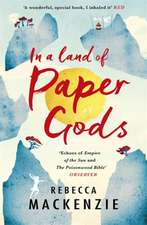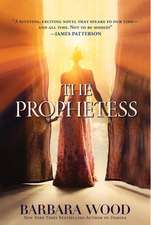To See Your Face Again: The Savannah Quartet
Autor Eugenia Priceen Limba Engleză Hardback – 9 sep 2013
THE NEW YORK TIMES BESTSELLER
This second installment of the Savannah Quartet continues the powerful story of the Browning and Mackay families with stunning detail, sympathy for humanity, and intimate family history.
Natalie Browning was a spoiled belle of sixteen when she met the man of her dreams aboard the steamship Pulaski. Burke Latimer, only eight years her senior, was a self-made man with no time for a pretty child. Then a night of terror ended the voyage and Burke discovered another Natalie. But the night that brought him love also wreaked disaster on his fortune, and Burke was forced to ask Natalie to wait until he could make a home worthy of her. Life had never denied Natalie before. Her need to be with Burke drove her to follow him to Georgia's back country, hoping to show him she was ready to be his bride. Could she grow up before she lost the love of her life forever?This second installment of the Savannah Quartet continues the powerful story of the Browning and Mackay families with stunning detail, sympathy for humanity, and intimate family history.
Citește tot Restrânge
| Toate formatele și edițiile | Preț | Express |
|---|---|---|
| Paperback (1) | 184.11 lei 3-5 săpt. | |
| Turner – 9 sep 2013 | 184.11 lei 3-5 săpt. | |
| Hardback (1) | 243.26 lei 3-5 săpt. | |
| Turner – 9 sep 2013 | 243.26 lei 3-5 săpt. |
Preț: 243.26 lei
Nou
Puncte Express: 365
Preț estimativ în valută:
46.55€ • 50.55$ • 39.10£
46.55€ • 50.55$ • 39.10£
Carte disponibilă
Livrare economică 01-15 aprilie
Preluare comenzi: 021 569.72.76
Specificații
ISBN-13: 9781630264734
ISBN-10: 1630264733
Pagini: 552
Dimensiuni: 140 x 216 x 35 mm
Greutate: 0.84 kg
Editura: Turner
Seria The Savannah Quartet
ISBN-10: 1630264733
Pagini: 552
Dimensiuni: 140 x 216 x 35 mm
Greutate: 0.84 kg
Editura: Turner
Seria The Savannah Quartet
Notă biografică
Eugenia Price (1916?1996) was a New York Times bestselling author of 39 books, with over 40 million copies sold. She is best known for her historical romantic antebellum novels.
Recenzii
“Ms. Price [has a] knack for recreating a bygone era with such compelling and authentic historic detail.” —The New York Times
“Eugenia Price is a name spoken with affection by millions of readers.” —Publishers Weekly
“Newcomers to Ms. Price's work should soon join her legions of faithful readers.” —Chattanooga Times
“[Price is] a consummate storyteller of meticulously researched and emotionally moving novels of the South.” —Rave Reviews
“Eugenia Price is a name spoken with affection by millions of readers.” —Publishers Weekly
“Newcomers to Ms. Price's work should soon join her legions of faithful readers.” —Chattanooga Times
“[Price is] a consummate storyteller of meticulously researched and emotionally moving novels of the South.” —Rave Reviews
Extras
Just at sunrise on June 13, 1838, forty-six-year-old Mark Browning stood at the open east window of his mercantile office on Savannah’s Commerce Row and stared out over the brightening expanse of water toward the wide bend that turns the river toward the sea.
From the moment of his first glimpse of this view when he was twenty and had cast his lot with this small city, the bend in the river had lifted Mark’s spirit and confirmed his choice that Savannah was, indeed, his place-to-be for all the days of his life.
Year after intervening year, from this very window, even when the room where he now stood had been the office of his late, revered friend, Robert Mackay, Mark had taken delight in scanning the river traffic—an odd assortment of local boats and mighty sailing ships—as it moved slowly around that bend, each vessel nourishing the life of his city. Now, and for the past few years, steam packets plied the gray waters, speeding the town’s growth, expanding his own pride in Savannah.
But on this early morning, so many troubled and contradictory thoughts tangled in his mind that he seemed almost unaware of what he saw. Trying to think his way through the vexing problem learned moments ago from his warehouse inspector, he crossed the spacious office furnished with a few fine pieces brought down from his old home in Philadelphia, and looked out the west window. Three slips away from his wharf, beyond the furled sails of two of his own schooners, he could see unusual bustle and activity where the new steam packet Pulaski now lay at anchor—white bow dazzling in the early sun, flags snapping in a rising breeze off the water. He could hear the commotion, far noisier than usual, because at 8 A.M., less than two hours from now, the Pulaski, carrying a large and prominent group of passengers on her fourth voyage, would steam away from the city and head for Charleston and then Baltimore.
Half an hour ago, when Mark left his home on Reynolds Square, the entire household had been in confusion. His wife, Caroline, their two children, Natalie, sixteen, and twelve-year-old Jonathan, and all the servants had been in a state of turmoil as everyone seemed to be checking at once to make sure that for her much-anticipated pleasure excursion, Natalie had everything she might need. Mark and Caroline had feigned cheerfulness at breakfast while inside both were anxious because their spirited, red-haired, willful firstborn was about to make a sea voyage without them. As far as Natalie was concerned, she was going for pleasure, although she had agreed to help Virginia Mackay, a family friend, care for her two small children during the journey and at Virginia’s aunt’s home in Baltimore. Some responsibility would be good for Natalie, but most worrisome of all was the girl’s obvious delight to be going in the care of Mark’s strange, troubling uncle, Osmund Kott. Both parents had exchanged concerned glances when Natalie announced as they sat down to breakfast that “the very best part of all this is that dear Kottie will be watching over me. No one, but no one understands me the way Kottie does!”
Their daughter’s stubborn devotion to Mark’s uncle had deepened the strain Kott’s very existence had caused between him and Caroline for all the years of their married life—and before.
From the moment of his first glimpse of this view when he was twenty and had cast his lot with this small city, the bend in the river had lifted Mark’s spirit and confirmed his choice that Savannah was, indeed, his place-to-be for all the days of his life.
Year after intervening year, from this very window, even when the room where he now stood had been the office of his late, revered friend, Robert Mackay, Mark had taken delight in scanning the river traffic—an odd assortment of local boats and mighty sailing ships—as it moved slowly around that bend, each vessel nourishing the life of his city. Now, and for the past few years, steam packets plied the gray waters, speeding the town’s growth, expanding his own pride in Savannah.
But on this early morning, so many troubled and contradictory thoughts tangled in his mind that he seemed almost unaware of what he saw. Trying to think his way through the vexing problem learned moments ago from his warehouse inspector, he crossed the spacious office furnished with a few fine pieces brought down from his old home in Philadelphia, and looked out the west window. Three slips away from his wharf, beyond the furled sails of two of his own schooners, he could see unusual bustle and activity where the new steam packet Pulaski now lay at anchor—white bow dazzling in the early sun, flags snapping in a rising breeze off the water. He could hear the commotion, far noisier than usual, because at 8 A.M., less than two hours from now, the Pulaski, carrying a large and prominent group of passengers on her fourth voyage, would steam away from the city and head for Charleston and then Baltimore.
Half an hour ago, when Mark left his home on Reynolds Square, the entire household had been in confusion. His wife, Caroline, their two children, Natalie, sixteen, and twelve-year-old Jonathan, and all the servants had been in a state of turmoil as everyone seemed to be checking at once to make sure that for her much-anticipated pleasure excursion, Natalie had everything she might need. Mark and Caroline had feigned cheerfulness at breakfast while inside both were anxious because their spirited, red-haired, willful firstborn was about to make a sea voyage without them. As far as Natalie was concerned, she was going for pleasure, although she had agreed to help Virginia Mackay, a family friend, care for her two small children during the journey and at Virginia’s aunt’s home in Baltimore. Some responsibility would be good for Natalie, but most worrisome of all was the girl’s obvious delight to be going in the care of Mark’s strange, troubling uncle, Osmund Kott. Both parents had exchanged concerned glances when Natalie announced as they sat down to breakfast that “the very best part of all this is that dear Kottie will be watching over me. No one, but no one understands me the way Kottie does!”
Their daughter’s stubborn devotion to Mark’s uncle had deepened the strain Kott’s very existence had caused between him and Caroline for all the years of their married life—and before.
Descriere
Descriere de la o altă ediție sau format:
THE NEW YORK TIMES BESTSELLER
This second installment of the Savannah Quartet continues the powerful story of the Browning and Mackay families with stunning detail, sympathy for humanity, and intimate family history.
Natalie Browning was a spoiled belle of sixteen when she met the man of her dreams aboard the steamship Pulaski. Burke Latimer, only eight years her senior, was a self-made man with no time for a pretty child. Then a night of terror ended the voyage and Burke discovered another Natalie. But the night that brought him love also wreaked disaster on his fortune, and Burke was forced to ask Natalie to wait until he could make a home worthy of her. Life had never denied Natalie before. Her need to be with Burke drove her to follow him to Geogia's back country, hoping to show him she was ready to be his bride. Could she grow up before she lost the love of her life forever?This second installment of the Savannah Quartet continues the powerful story of the Browning and Mackay families with stunning detail, sympathy for humanity, and intimate family history.






















